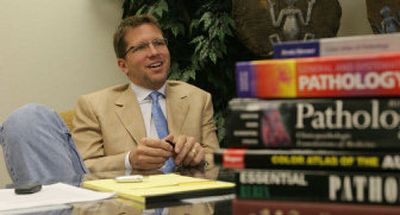Lawyer in Vioxx trial known for putting on a theatrical show

HOUSTON — Mark Lanier doesn’t need a church to have a pulpit.
The 44-year-old Houston litigator once aimed to be a preacher, earning a seminary degree after honing his oratory skills before a congregation of 1,000 at his hometown church in West Texas.
But the law beckoned and he found his lucrative niche — preaching to a “congregation” of 12 in small-town Texas courtrooms with a bruising mix of flash, charm and righteousness.
Soon, Lanier will capture national attention when he takes on pharmaceutical giant Merck & Co. in the country’s first case involving an alleged Vioxx-related death to go to trial since the company pulled the popular painkiller from the market last year. A pool of about 100 jurors are slated to fill out questionnaires Monday as lawyers begin sorting through jury selection.
“I don’t guarantee wins. I’ve tried too many cases for that,” Lanier said in his Western-themed office on the outskirts of Houston. “I do guarantee a good time.”
Lanier is known for his rapport with juries and his ability to simplify complicated issues into his stark visions of right and wrong.
“He is one of the rare voices of his generation absolutely committed to trial by jury and he is extraordinary,” said David Berg, a Houston civil litigator who has worked with Lanier.
The son of a railroad company salesman and a homemaker in Lubbock, Lanier eschews liquor, smoking and cursing, instead peppering his speech with “bloomin”’ and “dad-gum.” The only giveaway to the age of the married father of five are a few specks of gray in his beard stubble, which he shaves for court.
Behind his youthful looks and affable nature lurks a skill to demonize companies and mock CEOs with wide-eyed indignation.
His plan for Merck is no different. The company voluntarily took Vioxx off the market when a clinical trial showed patients who took it for 18 months or more could double their risk of heart attack or stroke. Lanier plans to argue that move was too little, too late.
He also plans to show a videotaped deposition of former Merck CEO Ray Gilmartin during which Lanier questioned Merck’s reaction to a study where six people taking Vioxx had so-called heart events compared to one of 100 taking a placebo.
When Gilmartin said there was no real difference between one and six, Lanier said he slapped a dollar bill on the table and asked for six back. The CEO answered he didn’t have six dollars. “I’ll take a check,” Lanier said he countered.
“And I’m going to play it for the jury because that’s bogus. That’s what I call dancing,” he said.
Lanier reveals his trial strategy as a means of scaring companies into settlements, said Robert Thackston, a Dallas civil defense lawyer who represented DaimlerChrysler in an asbestos case against Lanier two years ago that was settled a few days into trial.
Merck’s legal team should keep jurors “focused on the real evidence in the case and away from his hyperbole and melodrama, the yarn that Mark will spin about corporate evildoers,” said Thackston.
Lanier graduated from the Texas Tech School of Law, and has been generous to his alma mater, last year giving the law school $6 million — the largest gift in its history.
He began his career in 1984 with Fulbright & Jaworski, the same firm he will face in the Vioxx trial. He said he left because he identified more with plaintiffs, and in 1990 he founded his Lanier Law Firm.
For his first big case he enlisted help from noted Houston plaintiffs’ lawyer John O’Quinn in a breach of contract battle with Amoco Corp. They won a $417 million verdict, which fell to $50 million at settlement.
Lanier later scored on his own against Amoco with a $115 million verdict for 21 steelworkers in an asbestos case. Other wins include last year’s $100 million settlement from hospital supplier Becton Dickinson in an antitrust case.
Last October he lost when he represented Kelly-Moore Paint Co. Inc. in an unusual asbestos case against Union Carbide Corp. Jurors rejected 11-1 Lanier’s argument that a company facing asbestos liabilities was victimized by its supplier, despite his comparison of asbestos suppliers to drug dealers, Osama Bin Laden and a lynch mob, said Peter Bicks, Union Carbide’s lead attorney.
“Those Geraldo Rivera-like phrases don’t always pass the substance test,” Bicks said.
“If trial counsel devises the right game plan, ensuring that the jury can hear all the facts presented fairly and accurately, Mr. Lanier’s claims can be defeated even on his home court, and even in the most challenging of cases for a corporate defendant,” he said.